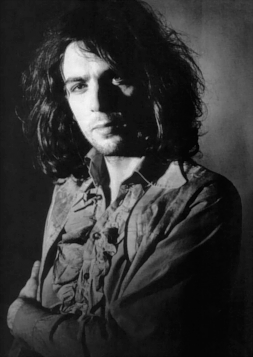Jokers Wild were a British rock band formed in Cambridge, England, in 1964. The group were active until 1967, and are best known for launching the career of guitarist David Gilmour, who went on to join Pink Floyd.

Steve Peregrin Took was an English musician and songwriter, best known for his membership of the duo Tyrannosaurus Rex with Marc Bolan. After breaking with Bolan, he concentrated on his own singer-songwriting activities, either as a solo artist or as a frontman for several bands.
John Charles Edward Alder, also known as Twink, is an English drummer, actor, singer, and songwriter who was a central figure in the English psychedelic movement.

The Madcap Laughs is the debut solo album by the English singer-songwriter Syd Barrett. It was recorded after Barrett had left Pink Floyd in April 1968. The album had a lengthy recording history, with work beginning in May 1968, but the bulk of the sessions taking place between April and July 1969, for which five different producers were credited − including Barrett, Peter Jenner, Malcolm Jones, and fellow Pink Floyd members David Gilmour and Roger Waters. Among the guest musicians are Willie Wilson from Gilmour's old band Jokers Wild and several members of Soft Machine.

Barrett is the second and final studio album of new material released by former Pink Floyd frontman Syd Barrett. Recording began at Abbey Road Studios on 26 February 1970, and lasted for 15 sessions until 21 July. The album was produced by Pink Floyd's David Gilmour and Richard Wright, who also contributed on bass and keyboards respectively, along with previous Madcap contributor Jerry Shirley on drums.

"See Emily Play" is a song by English rock band Pink Floyd, released as their second single on 16 June 1967 on the Columbia label. Written by original frontman Syd Barrett, it was released as a non-album single, but appeared as the opening track of Pink Floyd, the US edition of the band's debut album The Piper at the Gates of Dawn (1967).

"Interstellar Overdrive" is an instrumental composition written and performed by Pink Floyd. The song was written in 1966 and is on their 1967 debut album, The Piper at the Gates of Dawn, clocking in at almost ten minutes in length. It features long sections of free-form instrumental improvisation reflective of the group's live performances.
"Remember a Day" is a song by the English rock band Pink Floyd, written and sung by their keyboardist Richard Wright, appearing on their second album, A Saucerful of Secrets (1968). It was performed by Pink Floyd only once, as an encore in May 1968; it was subsequently performed by David Gilmour in September 2008 in memory of Wright, who had recently died of cancer, on Later... with Jools Holland, and by Nick Mason during his Saucerful of Secrets tour. The dreamy, poetic lyrics are about nostalgia for the lost paradise of early childhood.

"Arnold Layne" is a song by English rock band Pink Floyd. Released on 10 March 1967, it was the band's first single release. It was written by Syd Barrett.

Roger Keith "Syd" Barrett was an English singer, guitarist and songwriter who co-founded the rock band Pink Floyd in 1965. Barrett was the band's frontman and primary songwriter, known for his whimsical style of psychedelia, English-accented singing, and stream-of-consciousness writing style. As a guitarist, he was influential for his free-form playing and for employing effects such as dissonance, distortion, echo and feedback.

Paul Fraser Rudolph is a Canadian guitarist, bassist, singer, and cyclist. He made his mark in the UK underground music scene, and then as a session musician, before returning to Canada to indulge his passion for cycling. He resided in Gibsons, British Columbia, where he owned and operated a bicycle business, Spin Cycle. He has since retired to Victoria, British Columbia.

The Pink Floyd and Syd Barrett Story is a 2001 television documentary produced by Otmoor Productions for BBC Two's Omnibus series and originally called Syd Barrett: Crazy Diamond. Directed by John Edginton, the film includes interviews with all the Pink Floyd members – Roger Waters, David Gilmour, Nick Mason and Richard Wright – plus the "fifth Pink Floyd", Bob Klose, who left the band in 1965, getting their points of view on the original band founder Syd Barrett. The film includes rare early television appearances of Pink Floyd, and home movies.
"Scream Thy Last Scream" is a song by Pink Floyd, written by frontman Syd Barrett and scheduled to be the band's next single after "See Emily Play".
"Terrapin" is the opening song on Syd Barrett's first solo album The Madcap Laughs. Its arrangement is sparse, like much of the album, and features only acoustic and electric guitar accompaniment to the vocals. This song, along with "Maisie" and "Bob Dylan Blues"; reflected Barrett's early interest in the blues. Iggy the Eskimo, one of Barrett's acquaintances, had called the song "quite catchy".
"Here I Go" is a song by former singer/songwriter of Pink Floyd, Syd Barrett and is the sixth track on his first solo album, The Madcap Laughs.
Syd Barrett (1946–2006) was an English rock musician who was best known as the original frontman and primary songwriter of Pink Floyd. With the band, he recorded and wrote the majority of songs for their first album The Piper at the Gates of Dawn, and was credited for one song on their second album A Saucerful of Secrets. To this day, his Pink Floyd songs are used frequently on the band's various compilations.
Willie Wilson is an English rock drummer, known for his work with Pink Floyd and his long-time association with their guitarist, David Gilmour.









